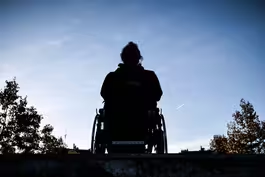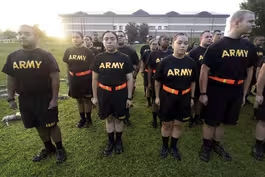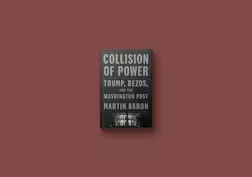
Winner of Nobel Prize in medicine on her work fighting COVID
Clip: 10/5/2023 | 6m 53sVideo has Closed Captions
Winner of Nobel Prize in medicine discusses how her work helped fight COVID-19
This week's Nobel Prize announcements are highlighting groundbreaking work once again in the sciences and medicine. William Brangham has a conversation with one of the year's winners in medicine, whose work led to a profound change in tackling the pandemic.
Problems playing video? | Closed Captioning Feedback
Problems playing video? | Closed Captioning Feedback
Major corporate funding for the PBS News Hour is provided by BDO, BNSF, Consumer Cellular, American Cruise Lines, and Raymond James. Funding for the PBS NewsHour Weekend is provided by...

Winner of Nobel Prize in medicine on her work fighting COVID
Clip: 10/5/2023 | 6m 53sVideo has Closed Captions
This week's Nobel Prize announcements are highlighting groundbreaking work once again in the sciences and medicine. William Brangham has a conversation with one of the year's winners in medicine, whose work led to a profound change in tackling the pandemic.
Problems playing video? | Closed Captioning Feedback
How to Watch PBS News Hour
PBS News Hour is available to stream on pbs.org and the free PBS App, available on iPhone, Apple TV, Android TV, Android smartphones, Amazon Fire TV, Amazon Fire Tablet, Roku, Samsung Smart TV, and Vizio.
Providing Support for PBS.org
Learn Moreabout PBS online sponsorshipAMNA NAWAZ: This week's Nobel Prizes are once again highlighting groundbreaking work in the sciences and in medicine.
William Brangham spoke with one of the winners whose work led to a profound change in tackling the pandemic.
WILLIAM BRANGHAM: This award was given to two people whose breakthrough work on messenger RNA made possible the creation of the COVID-19 vaccines, which have saved millions of lives around the world and helped bring a global pandemic under control.
One of those award winners joins us now, Hungarian-born biochemist Katalin Kariko.
She's also just published a very well-timed memoir called "Breaking Through: My Life in Science."
Katalin Kariko, so good to have you on the "NewsHour."
Enormous congratulations to you on this award.
We're just a few days now post this announcement.
I'm curious, how is this all sitting with you right now?
KATALIN KARIKO, Nobel Prize Winner: Thank you very much for inviting me.
Yes, it is a little bit hectic time, and didn't have enough time to settle all of this news about winning the Nobel Prize.
I just cannot believe it.
WILLIAM BRANGHAM: Did you do anything special to celebrate?
KATALIN KARIKO: Not really.
I was so tired.
WILLIAM BRANGHAM: Come on, not even a single glass of champagne or anything?
KATALIN KARIKO: Well, yes, we drank, yes, a little Hungarian wine.
WILLIAM BRANGHAM: Excellent.
Excellent.
As I mentioned, you were awarded this Nobel for years of dogged work that you and your colleague did on messenger RNA and your belief that in fact it would prove to be so revolutionary.
I'm curious, how is it that, when you look back, that you explain your belief that this little molecule could be so powerful?
KATALIN KARIKO: So, at 1989, when I started to work with messenger RNA, at the beginning, there were -- it was not as powerful as today.
It was like a very tiny amount of protein could be produced, which was seen for many people that is irrelevant for any kind of therapeutic use.
But, as time went by, just incremental improvement could be made.
And then, later, we -- when we could see in the mice some effect, then we thought that, oh, maybe it is useful for human also.
So, it was, like, incremental.
And we just -- we could improve the product.
WILLIAM BRANGHAM: But, as you detail in your memoirs, I mean, you had to push through years and years of skepticism and people who didn't believe you, institutions that didn't believe in you, people who pushed you out, even forced you to retire in some instances.
And yet you kept persevering.
You knew somewhere in the back of your mind that your work would be vindicated?
KATALIN KARIKO: I mean, I don't blame anybody for such action, but because I'm not focused on those people who were just a naysayer.
I always had one or two person who believed also with me, and then we proceeded together.
I don't blame.
I am not that kind of person.
It's fine.
I understand, the system is not set up properly.
That's what I would say.
WILLIAM BRANGHAM: The COVID vaccines, the arrival of the pandemic and then the development of the COVID vaccines, using this breakthrough obviously was proof to the world.
And, as I mentioned, your breakthrough saved millions of lives globally.
I mean, that has to be incredibly gratifying, Nobel Prize or not.
KATALIN KARIKO: Yes, indeed.
So, I -- 10 years ago, I started to work at the BioNTech.
And, 2018, BioNTech, Pfizer signed an agreement to develop mRNA-based vaccine for influenza.
And we already proceeded for two years.
We were ready with the product.
So -- and when COVID came, then we just had to change the template and we could have the right vaccine.
So, I was always happy that I was part of the -- this process.
That's how I felt.
WILLIAM BRANGHAM: As your memoir details, you came to the United States from remarkably modest circumstances back in Hungary, came here as a postdoc with $1,200 in cash stitched into the clothes of your child's teddy bear.
I mean, when you look at that trajectory to where you came from, to where you are today, do you ever reflect on that?
Do you ever stop and think how far you have come along?
KATALIN KARIKO: Yes, of course.
But if I say that my father had six elementary education and I grew up in a very modest home in a very small place, and I went on and went to university, I finished high school, went to university, and I went to then get Ph.D., and that was already -- if I keep looking back, it would be such a distance.
So, it is -- yes, this is a very long, long distance.
But I more, like, look forward and ahead, rather than keep looking back at, oh, that's a long distance.
Now, I should rest a little bit now.
(LAUGHTER) WILLIAM BRANGHAM: No resting at all, it sounds like.
WILLIAM BRANGHAM: I know you also did not go into this to become a champion of women in science, but the fact is, very few women have won this award.
I believe you're the 13th out of some 200 for the Nobel in medicine.
How do you view all the accolades that you're getting that you are yet another champion for women in science?
KATALIN KARIKO: Yes, many very talented scientists are there.
And they could not advance, because, yes, still, we give birth, and we have to take care of the child, but we have to share that responsibility with our partner, so that I keep telling them that find the right guy.
(LAUGHTER) WILLIAM BRANGHAM: Find the right guy, that's good advice, yes.
KATALIN KARIKO: Yes.
And I tell them, you don't have to choose between family and profession, because my daughter turned out fine.
She's a two-times Olympic champion.
She finished -- get Ivy League school finished here, and she get an MBA at UCLA.
So she did very well.
She learned just seeing me and my husband working hard.
WILLIAM BRANGHAM: It's a truly remarkable life and career.
And it sounds like you're only just getting started.
Katalin Kariko, it's such a pleasure to talk to you.
Congratulations on the Nobel Prize.
Thank you so much for talking with us.
KATALIN KARIKO: Thank you.
Advocates concerned about wages of workers with disabilities
Video has Closed Captions
Clip: 10/5/2023 | 10m 18s | Advocates concerned about workers with disabilities earning below minimum wage (10m 18s)
Army secretary on new recruiting plan after missing goals
Video has Closed Captions
Clip: 10/5/2023 | 7m 51s | Army secretary outlines new plan to attract soldiers amid recruiting struggles (7m 51s)
Biden asks Congress to provide more military aid for Ukraine
Video has Closed Captions
Clip: 10/5/2023 | 6m 42s | Biden asks Congress for more Ukraine funding as U.S. military aid is running out (6m 42s)
Martin Baron examines journalism and Trump in new book
Video has Closed Captions
Clip: 10/5/2023 | 6m 39s | Martin Baron examines The Washington Post during the Trump era in 'Collision of Power' (6m 39s)
Ringo Starr on his legendary time with Beatles and new music
Video has Closed Captions
Clip: 10/5/2023 | 8m 46s | Ringo Starr reflects on his legendary career with the Beatles and his new music (8m 46s)
Providing Support for PBS.org
Learn Moreabout PBS online sponsorship
- News and Public Affairs

FRONTLINE is investigative journalism that questions, explains and changes our world.

- News and Public Affairs

Amanpour and Company features conversations with leaders and decision makers.












Support for PBS provided by:
Major corporate funding for the PBS News Hour is provided by BDO, BNSF, Consumer Cellular, American Cruise Lines, and Raymond James. Funding for the PBS NewsHour Weekend is provided by...





